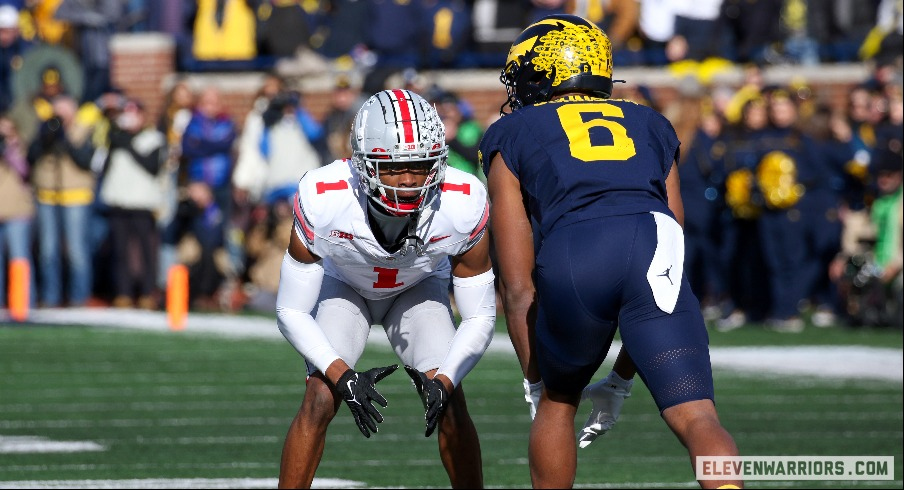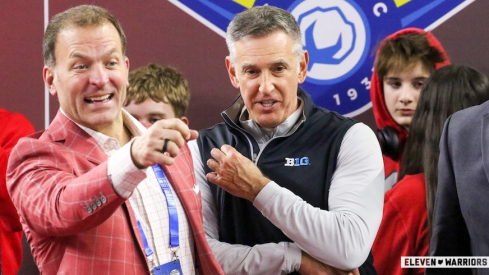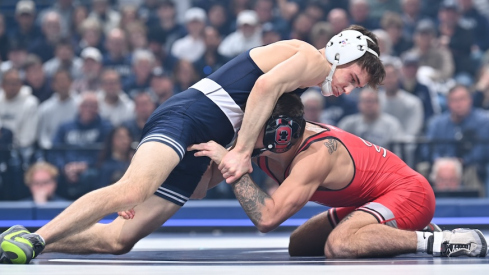College football remains one of the few entities to which television networks can attach themselves at the hip.
With more options than ever for people to spend their viewership time and money on, sports are one of the few things sure to attract ratings, and no sport in America is more popular than football. That's why the Big Ten was able to sign its seven-year, $7 billion media rights deal with FOX, CBS and NBC.
As such, while it's athletic departments and conferences that set a team's week-to-week schedule, it's those networks that dictate where fans can watch prospective games and at what time they'll be played.
This week, FOX president of insight and analytics Michael Mulvihill sat down with broadcaster Joel Klatt on his podcast, “The Joel Klatt Show,” to reveal how some of the sausage is made.
It all begins with a draft. Not of players, not of games, but of dates. Network executives involved in a given conference will pick which weekends they want control of through a selection process based on their buy-in. FOX is the biggest player in the Big Ten.
"In the case of the Big Ten, we and CBS and NBC go through a draft where FOX holds the first three picks on the board, then we have number six and our next one is a little later than that," Mulvihill said. "So it's not just a straight rotation one, two, three; one, two, three. The picks change a little bit as we go through that selection order and we spend a lot of time thinking about, 'What are we gonna do with those top three picks?'"
Mulvihill added that FOX will have the top three selections for the conference's dates over the next few years, giving them an "advantageous" position in getting the marquee matchups.
Rivalry weekend and the feature of Ohio State's annual showdown with Michigan is, to no one's surprise, consistently the first pick off the board, which is why The Game has been on FOX with such regularity.
"We don't really earn our salaries by picking Michigan/Ohio State number one," Mulvihill said. "Any college football fan would see that that's the obvious first selection. Then when you start thinking about those next couple of choices, it gets a little bit more interesting."
"WE DON'T REALLY EARN OUR SALARIES BY PICKING MICHIGAN/OHIO STATE NUMBER ONE. ANY COLLEGE FOOTBALL FAN WOULD SEE THAT THAT'S THE OBVIOUS FIRST SELECTION."– Mike Mulvihill
Much like a draft for a sports league, picks can also be based on scarcity rather than simply the merits of given games. If there are multiple marquee matchups to choose from on a given weekend, FOX executives may elect to pick a different date and ensure they get the best game when the depth of quality is thinner.
Using this year as an example, Mulvihill and company took rivalry weekend first overall for access to The Game and Sept. 7 second to get Michigan vs. Texas.
Mulvihill said the third pick was debated "more than any other pick in the history of college football on FOX." Nov. 2, which features both Ohio State at Penn State and Oregon at Michigan, and Oct. 12 for Ohio State at Oregon were the two dates they couldn't decide between.
The novelty and gravitas of Ohio State at Oregon was a huge draw, but the network likes to put its marquee games at noon ET, which would mean a 9 a.m. game for the players on the West Coast.
"We have built our FOX college football identity around the idea of playing our best games at noon," Mulvihill said. "We have built that into the most-watched game of the week in college football. We have an enormous pride in it, I take a lot of personal pride in what we have built there. ... (Having that game) would trigger a domino effect on that date where we would have to play later in the day, another network would get to play in our noon window, we would have to put a lesser game on in the noon window."
Another major factor that pointed toward Nov. 2 had nothing to do with football, and that's the presence of Election Day on Nov. 5, Mulvihill said. Premium advertising dollars from political organizations will be lining network pockets that weekend.
In the end, the call was so close that Mulvihill and company opted to trade the third pick instead and traded back up later in the draft. They still landed on Nov. 2 after another network took Oct. 12. FOX wound up with five of the top seven selections.
The corporate executives will also talk with their own broadcasters and other analysts to scout which teams – and therefore which games – will be good. Another factor is upcoming contract renewals that the network has with its distribution partners, be they cable or satellite providers, YouTubeTV or other broadcast services. They want to perform well in the same regions that those partners do when it comes time to negotiate those deals.
"We spend a lot of time thinking about it because there's a lot of money at stake. There are huge audiences that we're trying to capture," Mulvihill said. "The college football draft is basically the world's greatest fantasy football draft, but it takes $500 million to play. So it's a little different than your $50, $100 fantasy football draft with your friends, it's different in terms of the stakes, but it's not that different in terms of the mechanics."
Once control of the dates is set through the draft, the networks pick which games they'll broadcast and in which timeslots two weeks before each weekend. FOX, with control of Nov. 2, will choose whether it wants the Ohio State/Penn State game or Michigan/Oregon game and at what time that game is played on Oct. 19.
This is where college football differs from the NFL, because in the professional ranks, the league maintains complete control over the schedule. They choose the times and networks. The networks can lobby the league and come up with a wish list of games, Mulvihill said, but it's ultimately up to the shield.
Such control allows for networks to experiment like FOX is with Friday night college football games in 2024, which Mulvihill sees as the next step.
"Last season was the most-watched season of college football in history," Mulvihill said. "If you add up all the time that was spent watching games, not just on FOX but on all networks, No. 1 season of college football of all-time. So we feel like the business of college football is evolving in a positive way. The viewership has never been higher, the interest has never been higher and we're just looking for ways to push that even further."


